One recent study has found that women are more likely to detect early signs of a coronavirus infection due to being better at noticing subtle changes in their bodies.
Discover our latest podcast
Women and men detect different early COVID symptoms
The study, conducted by researchers at King’s College, London, used data from the Zoe COVID Symptom Study app and found that women also often detect different signs of an early coronavirus infection than men. Results showed that men tended to report shortness of breath, chills, fever and fatigue. Meanwhile, women were more likely to pick up on early COVID signs such as loss of smell, chest pain and a persistent cough.
King’s researchers speculate that the difference in early symptom detection could be biological or could also be due to women being able to more accurately notice subtle changes in their bodies, such as loss of smell. On the other hand, symptoms such as fever and shortness of breath may come at a later stage of infection and are much harder to ignore.
The study’s lead author Claire Steves commented, stating that signs of a COVID infection may look different depending on a multitude of factors, and it’s essential to know which symptoms you’re likely to face so you know when to take a test:
It's important people know the earliest symptoms are wide-ranging and may look different for each member of a family or household. We're not the first study to show a difference in symptom reporting between men and women. Women report more symptoms overall than men, and women might be more sensitive to a wide range of symptoms. They are more likely to recognise symptoms within themselves.
Steves continued: ‘The point is we found a slightly different structure of symptoms between women and men, which means they may well need different symptoms to prompt them to get a test.’
We've always been a little bit concerned there were only three core symptoms, and now that testing is widely available, we should encourage people to get tested even if they have symptoms that aren't core.
Currently, government advice states anyone who experiences a persistent cough, a change in smell, or a fever should self isolate and take a coronavirus test. However, the study’s findings published in Lancet Digital Health found 18 different symptoms associated with COVID and reported that 80% of coronavirus cases could be determined from the following signs:
- Loss of smell
- Chest pain
- Persistent cough
- Abdominal pain
- Blisters on the feet
- Eye strain/soreness
- Random muscle pain
Different age groups also found to report different COVID symptoms
The study also found thatpeople of different ages are likely to report different coronavirus symptoms.
Those aged 60 and over were more likely to experience diarrhoea, but they were also less likely to report any loss of smell. Likewise, the symptom wasn’t found at all in those over 80.
Fever was also not a symptom of early COVID infection in any age group, despite still being considered a symptom of the virus. This could suggest that sufferers may have already had their COVID infection for some time before developing a high temperature.
King’s College researcher Dr Liane dos Santos Canas explained: ‘Currently in the UK, only a few symptoms are used to recommend self-isolation and further testing. Using a larger number of symptoms and only after a few days of being unwell, using artificial intelligence, we can better detect Covid-19 positive cases. ‘
We hope such a method is used to encourage more people to get tested as early as possible to minimise the risk of spread.
The modelling study used artificial intelligence to predict early signs of COVID infection and was conducted using the original strain of coronavirus, as well as the Alpha variant first detected in Kent. However, researchers also believe that just as early symptoms were varied depending on age and sex, different strains could also present other early signs.














